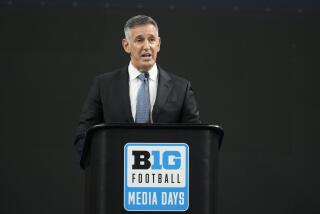BCS Panel to Hold Summit
- Share via
In an effort to stave off dissension in the lower ranks and possible legal action, the bowl championship series oversight committee announced Monday it will hold a Sept. 8 summit meeting in Chicago with representatives from non-BCS conferences.
Monday’s BCS conference call with reporters to outline the meeting came the day before today’s planned media teleconference call involving several presidents of non-BCS schools, who are demanding changes in the system that governs major college football.
Nebraska Chancellor Harvey Perlman, a member of the recently formed BCS oversight committee, said Monday’s offer was more olive branch than pre-emptive strike.
“Those of us in the conferences that manage the BCS recognize that improvements in the system can be made,” he said.
Unlike college basketball, which is governed by the NCAA, major college football is essentially run by leaders of the six major conferences -- Pacific 10, Big Ten, Atlantic Coast, Big 12, Big East and Southeastern -- and football independent Notre Dame, ABC television and the four major bowls: Rose, Fiesta, Sugar and Orange.
The eight-year deal involving ABC and the BCS is worth $930 million through the 2005 season.
Members of the five non-BCS conferences -- Mountain West, Conference USA, Western Athletic, Mid-American and Sun Belt--are demanding more access to a multimillion-dollar industry.
Tulane University President Scott Cowen, who is leading the fight for the non-BCS schools, recently said that a “system that has divided Division 1-A into two camps, haves and have-nots, and which essentially prevents 53 universities from competing for a national championship, should be dismantled.”
College football has been down this road before. In 1996, after Brigham Young was snubbed for a major bowl despite a 13-1 record and No. 5 national ranking, threat of an antitrust lawsuit forced the then-Bowl Alliance to become more inclusive.
After that season, any non-BCS school that ranked No. 6 or higher would automatically qualify for a major bowl.
The Bowl Alliance became the BCS in 1998 after the Rose Bowl joined a coalition that agreed to match the two highest-rated teams in a national title game rotated annually among the Rose, Fiesta, Sugar and Orange bowls.
In the five-year history of the BCS, however, no school from a non-BCS conference has played in a major bowl game. The “have-nots” argue that economic disparity has put them at a competitive disadvantage.
The BCS has insisted that non-BCS schools do have access to the system via the two at-large spots made available to the four major bowls. Officials said Monday that the BCS will have distributed $42 million to non-BCS schools when the contract expires after 2005.
“We’re quite confident that there isn’t an antitrust problem here,” said Ohio State President Graham Spanier, a BCS oversight committee member.
Still, the BCS appears willing to make more concessions as negotiations near for a new BCS deal, beginning in 2006.
“We are open to listening to their suggestions and what their concerns are,” Perlman said.
One way to make the BCS more inclusive could be to add a fifth “BCS bowl” game to the rotation. Perlman said the idea has “been informally discussed.”
One idea apparently not negotiable is an expanded college football playoff, a plan proposed by some non-BCS representatives that would include all champions of Division 1-A conferences.
Perlman has instructed major conference commissioners to “not pursue, at least at this point, an NFL-style playoff system.”
That directive does not preclude the chance of a possible limited playoff -- the so-called BCS-plus plan -- that would match the top-rated teams after the major bowls have been played.
More to Read
Go beyond the scoreboard
Get the latest on L.A.'s teams in the daily Sports Report newsletter.
You may occasionally receive promotional content from the Los Angeles Times.











